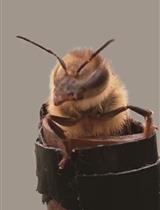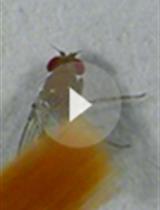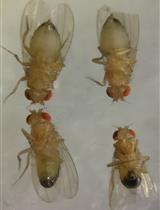- EN - English
- CN - 中文
Drosophila Endurance Training and Assessment of Its Effects on Systemic Adaptations
果蝇耐力训练及其对系统适应性影响的评估
(*contributed equally to this work) 发布: 2018年10月05日第8卷第19期 DOI: 10.21769/BioProtoc.3037 浏览次数: 7623
评审: Sunanda MarellaDivya SitaramanAnonymous reviewer(s)
Abstract
Exercise induces beneficial systemic adaptations that reduce the incidence of age-related diseases. However, the molecular pathways that elicit these adaptations are not well understood. Understanding the molecular mechanisms that underlie the exercise response can lead to widely beneficial therapies. Large populations, relatively short lifespan, and easily modifiable genetics make Drosophila a well-suited model system for complex, longitudinal studies. We have developed an enforced climbing apparatus for Drosophila, known as the Power Tower, for the study of systemic exercise adaptations. The Power Tower takes advantage of the fly’s natural instinct for negative geotaxis, an innate behavior to run upwards after being tapped to the bottom of their vial. Flies will continuously run either to the point of exhaustion or until the machine is turned off, whichever comes first. After 3 weeks of exercise, male Drosophila adapt to training with a number of conserved, easily quantifiable physiological improvements similar to those seen in mammalian models and humans. Here, we describe a useful endurance training protocol and a suite of post-training assessments that effectively quantify training effects.
Keywords: Drosophila melanogaster (黑腹果蝇)Background
Endurance exercise reduces the incidence of nearly every age-related disease (Ciolac, 2013). Endurance training has potent effects on cardiovascular function, energy metabolism, and mobility which are highly conserved from flies to humans (Piazza et al., 2009; Booth et al., 2015; Wilson et al., 2015). A better understanding of genetic mediators of exercise may lead to therapeutics that can benefit individuals that are unable to exercise due to illness or injury. Drosophila is a well-equipped model organism to help identify genetic mediators of exercise due to its short lifespan, easily modifiable genetics, and well-defined exercise response (Piazza et al., 2009).
We created a machine called the Power Tower, which utilizes Drosophila’s natural instinct for negative geotaxis to induce endurance training (Tinkerhess et al., 2012a). Wild-type male Drosophila respond to endurance training with increased endurance, speed, flight ability, resistance to cardiac stress, and increased lysosomal activity when compared to unexercised control flies (Piazza et al., 2009; Sujkowski et al., 2012; Tinkerhess et al., 2012b; Sujkowski et al., 2017). Here, we describe an updated endurance training protocol and a suite of post-training assessments that are useful for analyzing exercise adaptations. This suite of assessments has led to the identification of genes required for the exercise response in Drosophila, such as spargel (PGC-1α homolog) (Tinkerhess et al., 2012b) and to the identification of essential physiological mediators of the exercise response such as the biogenic amine octopamine (Sujkowski et al., 2017).
Our ramped endurance training protocol consists of three weeks of training, with flies being exercised daily for five consecutive days (Table 1), followed by two days of rest. Exercise adaptations can be assessed using a suite of five complementary assessments: fatigue, longitudinal climbing assessment, flight, cardiac pacing, and LysoTracker staining. The fatigue, flight, and longitudinal climbing assessments examine the flies’ endurance, flying ability, and speed, respectively. Cardiac pacing evaluates the heart’s ability to resist stress (Wessells and Bodmer, 2004). LysoTracker staining measures lysosomal activity, which increases in adipose tissue with exercise (Sujkowski et al., 2012). Together, these assessments constitute a collection of diverse responses to chronic exercise that can be used to evaluate potential genetic or pharmaceutical exercise mimetics.
Materials and Reagents
- Microscope Slides (Fisher Scientific, FisherbandTM, catalog number: 12-550-343 )
- Cover Slips (Fisher Scientific, FisherbandTM, catalog number: 12-548B )
- Aluminum Foil
- Drosophila Vials (VWR, catalog number: 89092-722 )
- Clear Polycarbonate Sheet (McMASTER-CARR, catalog number: 85585K25 )
- Plastic Funnel (Fisher Scientific, FisherbrandTM, catalog number: 10-500-3 )
- Polycarbonate Cylinder (McMASTER-CARR, catalog number: 8585K62
- Acrylic Cylinder Tube (36” length, 4” diameter) (McMASTER-CARR, catalog number: 8486K943 )
- Polystyrene Weighing Dish (Fisher Scientific, FisherbrandTM, catalog number: S67091A )
- Drosophila (Bloomington Drosophila Stock Center: https://bdsc.indiana.edu/)
- Carbon Dioxide
- Tangle Trap (BIOCONTROL NETWORK, catalog number: 268941 )
- Mineral Oil (Fisher Scientific, BioReagents, catalog number: BP26291 )
- FlyNap (Carolina Biological Supply, catalog number: 173025 )
- Signa Gel Electrode Gel (Parker Laboratories, SIGNAGEL®, catalog number: 15-60 )
- LysoTracker Green (Thermo Fisher Scientific, Molecular Probes®, catalog number: L7526 )
- Phosphate Buffered Saline (pH 7.0)
- VectaShield (Vector Laboratories, catalog number: H-1000 )
- Fly Food made by experimenter (see Recipes)
Equipment
- Power Tower
- 40” x 24” Plywood Board (Base)
- AC/DC Gearmotor (W.W. Grainger, model: 1LRA6 )
Manufacturer: Dayton, model: 1LRA6 . - Rigid Shaft Coupling (Climax Metal Products, model: ISCC-025-025-S )
- 12” x 5” x 1½” Boards x 4
- 12” x 5” x ¾” Plywood Board
- AC/DC Speed Control (Dayton, model: 4Z827 )
- 20 AMP Fuse (Cooper Bussmann, item number: 286547)
- Bent ¾” Square Tube Stock
- 14” x 11” Plywood Board x 2 (Platforms)
- Door Hinge
- Drawer Sliders x 4
- Styrofoam Pad x 2
- C-Clamp (W.W. Grainger, model: 2HUK2 )
Manufacturer: WESTWARD, model: 2HUK2 . - Nalgene Unwire Test Tube Racks x 4 (Thermo Fisher Scientific, ResmerTM, catalog number: 5970-0013PK )
- Shelf Bracket x 4
- Skateboard Wheel
- Jaece Identi-plugTM Plastic Foam Stopper (Jaece Industies, catalog number: L800-B2 )
- Incubator
- Square Rectangular Grid Screen (W.W. Grainger, model: 49N590)
Manufacturer: DIRECT METALS, model: 12002E063Y-48X96 . - 10" Bungee Cord (Home Depot Product Authority, model: 56052 )
- Bel-Art No Wire Test Tube Rack (SP Scienceware - Bel-Art Products - H-B Instrument, catalog number: F18745-0004 )
- Traceable Nano Timer (Fisher Scientific, FisherbrandTM, catalog number: 14-649-83 )
- Ring Stand x 2 (Eisco Labs, catalog number: CH0653E1RD4 )
- Claw Clamps (Fisher Scientific, FisherbrandTM, catalog number: 05-769-7Q )
- Chain Clamps x 2 (VWR, catalog number: 21573-275 )
- Three-prong Extension Clamp (Fisher Scientific, FisherbrandTM, catalog number: 05-769-7Q )
- Isolated Square-Wave Stimulator (Phipps & Bird, catalog number: 7092-611 )
- Olympus Camera (OLYMPUS, model: SP-570 UZ )
- Dissecting Microscope (OLYMPUS, model: SZ61 )
- Fluorescent Microscope (Leica Microsystems, model: DMI6000 B )
- Hemostat Straight (Specialized Products, catalog number: 083X020 )
Software
- ImageJ (National Institutes of Health, Bethesda, Maryland, USA)
Procedure
文章信息
版权信息
© 2018 The Authors; exclusive licensee Bio-protocol LLC.
如何引用
Damschroder, D., Cobb, T., Sujkowski, A. and Wessells, R. (2018). Drosophila Endurance Training and Assessment of Its Effects on Systemic Adaptations. Bio-protocol 8(19): e3037. DOI: 10.21769/BioProtoc.3037.
分类
神经科学 > 行为神经科学 > 实验动物模型 > 其它
您对这篇实验方法有问题吗?
在此处发布您的问题,我们将邀请本文作者来回答。同时,我们会将您的问题发布到Bio-protocol Exchange,以便寻求社区成员的帮助。
Share
Bluesky
X
Copy link












